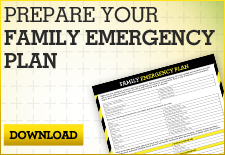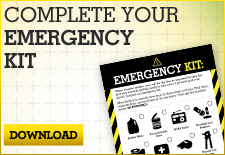
Disasters can happen… at any time. Be prepared to take action before, during and after.
Pandemic Influenza
An influenza (flu) pandemic is a global outbreak of a new version of the flu virus that can spread easily from person to person. Like the seasonal flu many people experience every year, pandemic flu will probably spread by infected people coughing or sneezing and by touching an infected surface. Unlike seasonal flu, people will have little immunity to the new flu virus that causes a pandemic, and many more people will get sick.
An influenza (flu) pandemic is a global outbreak of a new version of the flu virus that can spread easily from person to person. Like the seasonal flu many people experience every year, pandemic flu will probably spread by infected people coughing or sneezing and by touching an infected surface. Unlike seasonal flu, people will have little immunity to the new flu virus that causes a pandemic, and many more people will get sick.
- Cover your nose and mouth with a tissue when you cough or sneeze. Throw the tissue in the trash after you use it.
- Wash your hands often with soap and water, especially after you cough or sneeze. Alcoholbased hand cleaners are also effective.
- Avoid touching your eyes, nose or mouth.
- Try to avoid close contact with sick people, and avoid crowded places or venues.
- If you get sick with influenza, CDC recommends that you stay home from work or school and limit contact with others to keep from infecting them. Avoid contact with others until your temperature returns to normal for more than 24 hours without the assistance of fever reducing pharmaceuticals.
Additional information about pandemic influenza can be found on the CDC website or from your local public health department. During an outbreak, local TV, radio and your local emergency management agency can provide additional information.
Before
It is likely that you will know that a pandemic is occurring due to the nature of the spread of the disease. Because a pandemic is spread from person to person, it is important to have supplies around your home in case you need to isolate yourself from the population. In addition, actions taken to prevent regular flu can help you prevent contracting a pandemic flu.
1 – Complete the Family Emergency Plan and discuss it as a family. This is a simple way of keeping each member of the family informed on critical information: where to reconnect should you become separated, who to call, and what you will do should a pandemic influenza occur.
2 – Complete the Emergency Contacts Card and place one in your Emergency Kit.
3 – Prepare an Emergency Kit. The Emergency Kit should be easily accessible should you and your family be forced to shelter in place (stay at home) for a period of time.
- Increase your emergency supply of food and water from three days to two weeks. During a pandemic, if you cannot get to a store, or if stores are out of supplies, it will be important for you to have extra supplies on hand.
- Periodically check medication taken on a regular basis to make sure you have extra supplies in your home.
- Have nonprescription drugs and other health supplies on hand, including pain relievers, stomach remedies, cough and cold medicines, fluids with electrolytes, and vitamins.
- Contact your doctor to find out the best way to avoid the flu
- Get a yearly flu vaccination, especially if you are at high risk for flu complications.
- Discuss individual health concerns with your doctor.
- Practice good hygiene and wash your hands frequently.
- Cover your nose and mouth when coughing or sneezing.
- Regularly clean surfaces that are touched by multiple people.
- Stay healthy by eating a balanced diet, getting regular exercise and getting enough rest.
During
If a flu pandemic occurs, it will likely be a prolonged and widespread outbreak over a period of several months that could require temporary changes in many parts of everyday life, including school, work, transportation and other public services. During an outbreak, hospitals and doctors may be overwhelmed with sick patients, schools and business may choose to close, and public health officials may suggest isolation or quarantine to control the spread of the infection.
If a flu pandemic occurs, it will likely be a prolonged and widespread outbreak over a period of several months that could require temporary changes in many parts of everyday life, including school, work, transportation and other public services. During an outbreak, hospitals and doctors may be overwhelmed with sick patients, schools and business may choose to close, and public health officials may suggest isolation or quarantine to control the spread of the infection.
In the event of a pandemic flu outbreak, the best strategy will be to practice good hygiene to protect yourself from becoming sick and from transmitting the disease to others if you do become sick.
- Practice good hygiene and wash your hands frequently.
- Cover your nose and mouth when coughing or sneezing.
- Regularly clean surfaces that are touched by multiple people.
- Stay home from work or school when you are sick.
- Avoid crowded locations and social gatherings to protect yourself from the getting the flu.



